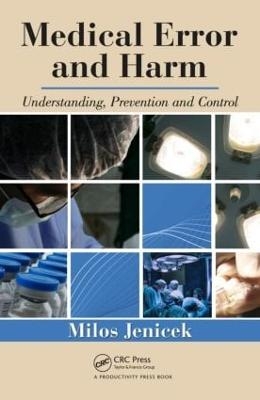
Medical Error and Harm
Productivity Press (Verlag)
978-1-4398-3694-1 (ISBN)
Recent debate over healthcare and its spiraling costs has brought medical error into the spotlight as an indicator of everything that is ineffective, inhumane, and wasteful about modern medicine. But while the tendency is to blame it all on human error, it is a much more complex problem that involves overburdened systems, constantly changing technology, increasing specialization, and a cycle of continual funding shortfalls made even more acute by resource-wasting inefficiencies.
Medical Error and Harm: Understanding, Prevention and Control, presents the work of long time physician and teacher Milos Jenicek, a pioneering expert on epidemiology, evidence-based medicine, and critical thinking and decision making in the health sciences. Providing an extraordinarily comprehensive overview of the subject that is as thorough and scientifically organized as it is accessible and free of rhetoric, Dr. Jenicek —
Presents a short history of error in general across various domains of human activity and endeavor, including concepts, methodologies of study, and management applications
Provides semantic and taxonomic classifications of challenges in medical error and harm, two distinct domains
Explores approaches used to investigate and ameliorate challenges in medicine and other health sciences
Explains why, when, and how studies and decisions regarding errors should be carried out, such as whether risk assessment should be undertaken in the diagnosis, treatment, or prognosis stage
Covers essential strategies for mitigating errors in the broader framework of medical care, specifically in community medicine and public health
Considers the ever-growing role of physicians in tort law and litigation
The book also discusses whether dealing with errors is a learned skill and looks at how much of the problem with medical error is caused by the medical community’s failure to teach, learn, and understand everything there is to know about medical error, including the often neglected importance of critical thinking skills. Understanding and correcting this shortfall is a primary responsibility of every health professional, one they can begin to realize with the study of these pages.
McMaster University, Hamilton, Ontario, Canada
Putting medical error and harm in context. Reducing errors and harm in medicine; beyond the ‘oops!’ factor. The valued legacy. Error and harm across general human experience in the non-medical domains. Welcome to lathology. Error and harm in the health sciences. Defining and classifying human error and its consequences in clinical and community settings. Describing medical error and harm. Their occurrence and nature in clinical and community settings. Analyzing medical error and harm. Search for their causes and consequences. Flaws in operator’s reasoning and decision making before action. Prevention, intervention and control of medical error and harm. Clinical epidemiological considerations of actions and their evaluation. Taking medical error and harm to court. Contributions of physicians and expectations of physicians in tort litigation and legal decision-making. Conclusions. A Brief and (hopefully) Harmonized Glossary. Appendices.
| Erscheint lt. Verlag | 7.7.2010 |
|---|---|
| Zusatzinfo | 16 Tables, black and white; 21 Illustrations, black and white |
| Verlagsort | Portland |
| Sprache | englisch |
| Maße | 152 x 229 mm |
| Gewicht | 657 g |
| Themenwelt | Medizin / Pharmazie ► Medizinische Fachgebiete ► Medizinethik |
| Studium ► Querschnittsbereiche ► Geschichte / Ethik der Medizin | |
| ISBN-10 | 1-4398-3694-9 / 1439836949 |
| ISBN-13 | 978-1-4398-3694-1 / 9781439836941 |
| Zustand | Neuware |
| Haben Sie eine Frage zum Produkt? |
aus dem Bereich


